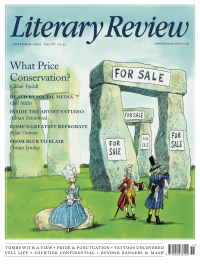Jay Gilbert
The Living & the Pale
Sundial
By Catriona Ward
Profile 334pp £14.99
I picked up Catriona Ward’s labyrinthine thriller Sundial at 11pm on a Sunday, intending to read a chapter or two before bed. Three hours later, I was breathlessly devouring the last few pages. As a word, ‘unputdownable’ is both ungrammatical and overused, but there is no better description of Ward’s gloriously gothic new novel. The book is grotesque from the outset, as we meet Rob and her husband, Irving, who inhabit a horror story of a marriage. Why does Rob tolerate Irving’s philandering and physical abuse, not to mention his pandering to their eerie eldest, Callie, and her unhealthy preoccupation with what is dead – or, as Callie puts it, ‘pale’? He must, we think, know something about Rob that we don’t.
As the story unfolds, we learn about Rob’s upbringing with her sister at Sundial, a remote ranch in Arizona. Her youth resembles more a sojourn on the island of Doctor Moreau than a conventional American childhood. Intertwined with the core narration provided by Rob, in which she travels

Sign Up to our newsletter
Receive free articles, highlights from the archive, news, details of prizes, and much more.@Lit_Review
Follow Literary Review on Twitter
Twitter Feed
Under its longest-serving editor, Graydon Carter, Vanity Fair was that rare thing – a New York society magazine that published serious journalism.
@PeterPeteryork looks at what Carter got right.
Peter York - Deluxe Editions
Peter York: Deluxe Editions - When the Going Was Good: An Editor’s Adventures During the Last Golden Age of Magazines by Graydon Carter
literaryreview.co.uk
Henry James returned to America in 1904 with three objectives: to see his brother William, to deliver a series of lectures on Balzac, and to gather material for a pair of books about modern America.
Peter Rose follows James out west.
Peter Rose - The Restless Analyst
Peter Rose: The Restless Analyst - Henry James Comes Home: Rediscovering America in the Gilded Age by Peter Brooks...
literaryreview.co.uk
Vladimir Putin served his apprenticeship in the KGB toward the end of the Cold War, a period during which Western societies were infiltrated by so-called 'illegals'.
Piers Brendon examines how the culture of Soviet spycraft shaped his thinking.
Piers Brendon - Tinker, Tailor, Sleeper, Troll
Piers Brendon: Tinker, Tailor, Sleeper, Troll - The Illegals: Russia’s Most Audacious Spies and the Plot to Infiltrate the West by Shaun Walker
literaryreview.co.uk